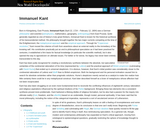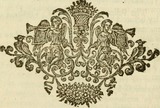
Born in Königsberg, East Prussia, Immanuel Kant (April 22, 1724 – February 12, 1804) was a German philosopher and scientist (astrophysics, mathematics, geography, anthropology) from East Prussia. Quite generally regarded as one of history’s truly great thinkers, Immanuel Kant is known for the historical synthesis of his transcendental method. His philosophy brought together the two major currents competing at the time of the Enlightenment, the metaphysical approach and the empirical approach. Through his “Copernican revolution,” Kant moved the criterion of truth from assertions about an external reality to the immediacy of the knowing self. His contribution practically put an end to philosophical speculation as it had been practiced for centuries, it established a firm basis for factual knowledge (in particular the scientific method), but it also opened the way to agnosticism on ultimate issues. For better or for worse, his legacy has never been entirely transcended to this day.
- Subject:
- Arts and Humanities
- Philosophy
- Material Type:
- Reading
- Provider:
- New World Encyclopedia
- Date Added:
- 08/04/2017
